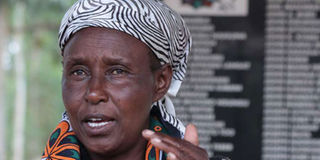Premium
Sachang’wan fire survivors still shed tears years later

Ms Naomi Waithera, a victim of the 2009 Sachang'wan fire tragedy, speaks during an interview on January 25, 2018 in Molo, Nakuru County. For a majority of the families, the relatives who perished in the tragedy were the breadwinners. PHOTO | AYUB MUIYURO | NATION MEDIA GROUP
What you need to know:
- For a majority of the families, the relatives who perished in the 2009 tragedy were the breadwinners.
- The families hope the government will compensate them and take care of the children orphaned by the tragedy as promised.
On January 31, 2009, an oil tanker overturned, caught fire and exploded at Sachang’wan on the Nakuru-Eldoret road, killing 130 people and leaving hundreds others with permanent scars.
Nine years later, the victims’ families say they have never received compensation.
Ms Gladys Waithira Kirigo, 80, was among those who lost close family members in the tragedy that shook Kenya and the world.
She was among the hundreds of people who turned up at the mass grave near the scene of the tragedy on Wednesday to pay tribute to those who died. The grave has 78 bodies.
MOURNERS
The octogenarian has dark memories of what happened before more than 345 families were thrown into mourning.
She has been visiting the Sachang’wan mass grave every year since her son, John Mungai Kirigo, died in the inferno.
“I could not recognise his body and so he was buried here together with 77 others.
"Very often, I feel like visiting the place because seeing his name gives me some consolation,” Ms Kirigo told the Nation as tears rolled down her cheeks.
The granny recalls the day as if it were yesterday. Apart from her son, her nephew John Mwangi also died in the fire.
“Mwangi died while being treated at the Nakuru Provincial (now Level Five) Hospital. He was buried at home because family members identified him,” the Ms Kirigo said.
DEAD SONS
And she was at the scene of the tragedy on Wednesday, struggling to find solace in the belief that her son is at peace in heaven.
“There is nothing else to do. I can hardly read, but I know where my son’s name is written. I feel like crying every time I come here,” she said.
Many other families told of how the tanker fire tragedy changed their lives for the worse.
Ms Rosemary Chepkwony, a Sachang’wan resident, lost two sons in the fire.
One of them was just from Mombasa to visit her and the other family members.
“I remember asking him to park his lorry at home before he begins the journey back to the Coast.
"He told me a friend of his who was a driver had called him for a chat. I had a sinking feeling in my gut as soon as he left home,” Ms Chepkwony said.
FAMILY
For a majority of the families, the relatives who perished in the 2009 tragedy were the breadwinners.
Ms Anne Kibenei, who lost her husband, was left with 12 children to fend for.
“My husband was the sole breadwinner. Most of the children were in school then and I had no source of income.
"I needed to feed and clothe them. The children also required other basics,” Ms Kibenei said.
With time, Ms Kibenei learnt to be tough. She set up a business and three of her children went to university a few years later.
Most of the remaining ones are in secondary school.
COMPENSATION
Many of those gathered at the site wanted to know why they had not been compensated for what they went through.
They have formed an association to push the government to compensate them.
The grand coalition government of Mwai Kibaki and Raila Odinga gave the families Sh30 million though many say they never received a penny.
“The government only took care of hospital and burial bills. We heard that it set aside Sh30 million but we have never seen it,” Ms Chepkwony, who is also the chairman of Sachang’wan Tragics, said.
She said the families were seeking audience with President Uhuru Kenyatta.
“We want him to hear our problems,” she said.
TREATMENT
Many of the survivors of the tragedy later died while some are still getting treatment.
Considering that a majority are poor, treatment is dear to the families.
“Many of the victims are suffering. Some can no longer work while many others have died,” Ms Chepkwony told the Nation.
The rest of the Kenyans may have moved on, but the families and survivors still vividly remember the tragedy.
The families hope the government will compensate them and take care of the children orphaned by the tragedy as promised.




